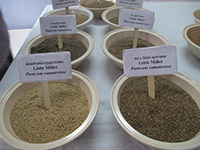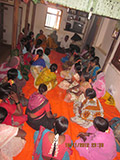BPF was invited to research and explore what has worked and not worked for a variety of practices and innovations in the fields of ground water and sanitation for Arghyam, a grant-making organisation.
Primary and secondary research was conducted on best practices in sanitation of five Araghyam partners in the states of Bihar, Karnataka, Rajasthan, Odisha and Tamil Nadu. The themes that were highlighted included government engagement, financing toilets, toilet usage and defunct toilets, community mobilisation and demand generation, urban sanitary complexes for women, beyond toilets, state of sanitation and reaching out to the last mile. Within each of these themes specific processes were documented regarding training, implementation, monitoring, roles and responsibilities of staff, financial aspects, factors influencing sustainability of the practice, and the replicability of the practices adopted. Instruments were developed and adapted for each best practice. The BPF team visited two site namely, Atmashakthi in Odisha and Bhartiya Jan Utthan Parishad (BJUP), in Nalanda, Bihar, to gain first-hand knowledge of their sanitation practices The outcome of this ongoing project will be an eight-chapter long publication on the best practices in sanitation, implementation across India.
The South-To-South HIV/AIDS Resource Exchange (SHARE) project commissioned BPF to document 20 practices covering a broad spectrum of India’s best HIV/AIDS prevention interventions.
This knowledge management product, meant for dissemination in Asia and Africa, capture key strategies that have proven to be effective, lessons learnt and roles and responsibilities of key stakeholders, government and other players in India. BPF collected and analysed primary and secondary data, interviewed doctors, experts and consultants, and wrote up each of the 20 different practices. After technical appraisals by the Government of India’s NACO advisors, feedback was incorporated, and the final approved document was designed and laid out.
Voluntary Health Services (VHS) who appointed BPF to document three best practices for the National Aids Control Organization (NACO), Ministry of Health and Family Welfare, Government of India, on HIV prevention, care and treatment over a three-month period.
The South-to-South HIV/AIDS Resource Exchange (SHARE) project has been developed with a vision of exchanging experiences, expertise and best practices between countries in Africa and the Indian subcontinent. It is supported by the United States Agency for International Development and administered by the Voluntary Health Services (VHS). These practices will be shared with other governments interested in replicating these practices.

The focus of the research is to examine the gender gaps within the food supply chain and the factors that influence them including ground realities and challenges faced by women and vulnerable populations, including the elderly, people with disability and children, in the supply chain and markets, and make recommendations accordingly.
A stakeholder analysis would be designed to assess partner capacities to implement the proposed measures. Government and project resources and programmes would be analysed to this end. Rights and entitlements of vulnerable groups especially women, would constitute the backdrop against which the findings are analysed. Recommendations for future implementation and monitoring would be proposed, so that the venture can contribute successfully to greater equality and reduced risk through a gender-sensitive approach. Gender equality in terms of the food supply chain would be examined in a multi-stakeholder context with regard to Participation/ involvement in all aspects of the food supply chain; Decision making in different aspects of the food supply chain; and Operations of the components of this chain. The access of women and men, of differently abled and other vulnerable populations, and the factors that influence social inclusion was analysed.

The M. S. Swaminathan Research Foundation (MSSRF) commissioned Best Practices Foundation (BPF) to take on a project to enable small millet producers to enhance their livelihoods through better market understanding. The study took place in five sites in Tamil Nadu – Salem, Namakkal, Coimbatore, Erode, and Kolli Hills.
Promoting small millet’s demands primarily requires that farmers themselves are made aware of the financial and environmental benefits of cultivating small millet. BPF recommends acquiring organic certifications as well as forming linkages with technical support institutions. Kolli Hills producers must establish quality control mechanisms, and they should build consumer trust by stating ingredients, lack of preservatives, and processing methods on the packaging. BPF encourages training local people from Kolli Hill to perform the role of distributors, doubling or even tripling the existing number of retail outlets in the process. BPF has proposed their MOVE livelihood model to make this happen. To form their marketing strategy, Kolli Hills producers need to research the different customer segments and develop their promotional material based on it. An onlinse shopping portal would be useful in building brand identity. This can also be done by dispelling myths about millets and disseminating information and benefits of millets in schools.

The 5-month project which began in November 2012 trained 34 participants in MOVE by BPF staff, 29 of these participants completed the training. By the end of the project 18 of the participants either went on to start their own business or scale up existing ones.
Thirty-four participants underwent MOVE trianing; 12 from Timmapur, 12 from Jekkinakatti, 5 from Mantrodi and 5 members of UAS staff. The training was conducted by BPF in partnership with the Department of Food Sciences and Nutrition, UAS, Dharwad. Twenty-nine participants completed the programme of which 18 went on to start their own businesses or scale up existing businesses. Ten of these businesses pertain to small millet products. Average incomes of entrepreneurs selling small millet products alone more than doubled from 850 INR to 2,113 INR. The other eight have added millet-based products as a second business. The new entrepreneurs were exposed to markets in Shiggaon and Hubli to enable them to expand their markets for millet products. All the participants have increased their income by up to 249%. The minimum income earned after MOVE was Rs 700 by Roopa Alagwadi; the maximum, Rs 5,700 by Shakuntala Kundagol.
MOVE Impact Small Millet Producers 1
For Karnataka Health Promotion Trust (KHPT)
Content for blurb: A compendium of case studies representing unique, creative, localised and community-focused strategies to improve outreach and increase service delivery in the prevention of the spread of HIV/AIDS.
Sangeetha Purushothaman and Mukta Banerjee
The Global Dialogues programme was initiated by the Ford Foundation in 2002 to draw visibility and greater legitimacy to the area of human sexuality, and thereby influence decision-making. In evaluating the work of the South and South-East Asia Resource Centre on Sexuality, based in TARSHI, an NGO in New Delhi, this report analyses results, identifies effective and sustainable strategies, and examines how organisational development issues affect results.
Maggie Huff-Rousselle, Sangeetha Purushothaman, Namani Tirupathaiah, John L. Fiedler
The USAID-funded Supplementary Nutrition Programme is one of the six components of the ICDS scheme of the Ministry of Women and Child Development. Its main objective is to reduce childhood malnutrition. This report documents and analyses the operational feasibility, financial viability and impact of the Decentralised Food Model (DFM). It also examines its potential for replication and scale-up in collaboration with other government departments and programmes.